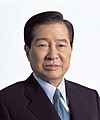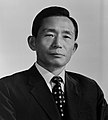Portal:South Korea
 |
환영합니다! / Welcome To The South Korea Portal!  South Korea, officially the Republic of Korea (ROK), is a country in East Asia. It constitutes the southern half of the Korean Peninsula and borders North Korea along the Korean Demilitarized Zone; though it also claims the land border with China and Russia. The country's western border is formed by the Yellow Sea, while its eastern border is defined by the Sea of Japan. South Korea claims to be the sole legitimate government of the entire peninsula and adjacent islands. It has a population of 51.96 million, of which half live in the Seoul Capital Area, the ninth most populous metropolitan area in the world. Other major cities include Busan, Daegu, and Incheon. The Korean Peninsula was inhabited as early as the Lower Paleolithic period. Its first kingdom was noted in Chinese records in the early 7th century BCE. After the unification of the Three Kingdoms of Korea into Silla and Balhae in the late 7th century, Korea was ruled by the Goryeo dynasty (918–1392) and the Joseon dynasty (1392–1897). The succeeding Korean Empire (1897–1910) was annexed in 1910 into the Empire of Japan. Japanese rule ended following Japan's surrender in World War II, after which Korea was divided into two zones: a northern zone, which was occupied by the Soviet Union, and a southern zone, which was occupied by the United States. After negotiations on reunification failed, the southern zone became the Republic of Korea in August 1948, while the northern zone became the communist Democratic People's Republic of Korea the following month. In 1950, a North Korean invasion began the Korean War, which ended in 1953 after extensive fighting involving the American-led United Nations Command and the People's Volunteer Army from China with Soviet assistance. The war left 3 million Koreans dead and the economy in ruins. The authoritarian First Republic of Korea led by Syngman Rhee was overthrown in the April Revolution of 1960. However, the Second Republic failed to control the revolutionary fervor. The May 16 coup of 1961 led by Park Chung Hee put an end to the Second Republic, signaling the start of the Third Republic in 1963. South Korea's devastated economy began to soar under Park's leadership, recording one of the fastest rises in average GDP per capita. Despite lacking natural resources, the nation rapidly developed to become one of the Four Asian Tigers based on international trade and economic globalization, integrating itself within the world economy with export-oriented industrialization. The Fourth Republic was established after the October Restoration of 1972, in which Park wielded absolute power. The Yushin Constitution declared that the president could suspend basic human rights and appoint a third of the parliament. Suppression of the opposition and human rights abuse by the government became more severe in this period. Even after Park's assassination in 1979, the authoritarian rule continued in the Fifth Republic led by Chun Doo-hwan, which violently seized power by two coups and brutally suppressed the Gwangju Uprising. The June Democratic Struggle of 1987 ended authoritarian rule, forming the current Sixth Republic. The country is now considered among the most advanced democracies in continental and East Asia. (Full article...) Selected article -Seoul, officially Seoul Special Metropolitan City, is the capital and largest city of South Korea. The broader Seoul Capital Area, encompassing Gyeonggi Province and Incheon, emerged as the world's sixth largest metropolitan economy in 2022, trailing behind Paris, San Francisco, Los Angeles, Tokyo, and New York, and hosts more than half of South Korea's population. Although Seoul's population peaked at slightly over 10 million, it has gradually decreased since 2014, standing at approximately 9.97 million residents as of 2020. Seoul is the seat of the South Korean government. Seoul's history traces back to 18 BC when it was founded by the people of Baekje, one of the Three Kingdoms of Korea. During the Joseon dynasty, Seoul was officially designated as the capital, surrounded by the Fortress Wall of Seoul. In the early 20th century, Seoul was occupied by the Japanese Empire, temporarily renamed "Keijō" ("Gyeongseong" in Korean). The Korean War brought fierce battles, with Seoul changing hands four times and leaving the city mostly in ruins. Nevertheless, the city has since undergone significant reconstruction and rapid urbanization. Seoul was rated Asia's most livable city, with the second-highest quality of life globally according to Arcadis in 2015 and a GDP per capita (PPP) of approximately $40,000. 15 Fortune Global 500 companies, including industry giants such as Samsung, LG, and Hyundai, are headquartered in the Seoul Capital Area, which has major technology hubs, such as Gangnam and Digital Media City. Seoul is ranked seventh in the Global Power City Index and the Global Financial Centres Index, and is one of the five leading hosts of global conferences. The city has also hosted major events such as the 1986 Asian Games, the 1988 Summer Olympics, and the 2010 G20 Seoul summit, in addition to three matches at the 2002 FIFA World Cup. (Full article...) Selected image The 2010 G-20 Seoul summit was the fifth meeting of the G-20 heads of government to discuss the global financial system and the world economy. It was held in Seoul, South Korea. More did you know -
In the news
This is a Good article, an article that meets a core set of high editorial standards.
4 Walls is the fourth studio album by South Korea-based girl group f(x), released by SM Entertainment and Genie Music on October 27, 2015. A predominantly electropop and synth-pop record that incorporates various genres, such as house, EDM and UK garage, 4 Walls was composed by several production teams and songwriters, namely LDN Noise, The Stereotypes, Kenzie, Ryan S. Jhun, Makeba Riddick, Carly Rae Jepsen, among others, with Lee Soo-man served as the executive producer of the release. It marked f(x)'s first major release since Red Light in July 2014, and subsequently their first and currently only major release as a quartet since the departure of former member Sulli in August 2015. Upon its release, 4 Walls was praised by music critics for increasingly showcasing all members' vocal abilities with "trendy" production. The album also attained commercial success, becoming their fifth and final chart-topper on the Gaon Album Chart, and has since sold over 81,000 physical copies in South Korea as of March 2016. It also earned success for f(x) in the United States, becoming their second release to achieve No. 1 on the Billboard World Albums Chart and charted at number thirty-nine on the Japanese Oricon Albums Chart. To promote the album, its titular track was released on October 27, 2015 to both critical and commercial success, peaking at number two on both the Gaon Digital Chart and the Billboard World Digital Songs. The group also appeared and performed the single on several music programs, including M Countdown, Music Bank and Show! Music Core. The group further embarked on their first concert tour, titled Dimension 4 – Docking Station, which visited South Korea and Japan in January and February 2016, to promote the majority of the album and their past releases. (Full article...) General images -The following are images from various South Korea-related articles on Wikipedia.
Did you know (auto-generated)
WikiProjectsSee WikiProject Korea for collaborating on South Korea topics, and more broadly, on all things Korea-related. South Korea topics
CategoriesAdministrative divisions of South Korea
Related portalsEast Asia Associated WikimediaThe following Wikimedia Foundation sister projects provide more on this subject:
Web resources
SourcesDiscover Wikipedia using portals |
























































